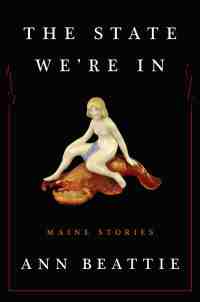The State We're In by Ann Beattie
 Wednesday, August 26, 2015 at 9:46AM
Wednesday, August 26, 2015 at 9:46AM 
Published by Scribner on August 11, 2015
The stories in The State We're In are snapshots of women at different stages of life. Nearly all of the action takes place in New England (mostly in Maine) although some memories and peripheral events occur in California and New York. Several of the stories are linked by characters or events. Each can be read without reference to any other story, but reading them together gives them additional weight.
Some stories are about young girls who are unraveling the mysteries of life. The first entry delves into the mind of Jocelyn, a high school student who can't quite wrap her mind around the future, isn't terribly engaged with the present, and doesn't know what to make of magical realism. "What Magical Realism Would Be" is one of my favorites in the collection. Jocelyn is still wondering about magical realism in "Endless Rain into a Paper Cup" but the perspective shifts to third person and the story -- more eventful than the first -- broadens to include her ill mother, the kindly uncle and batty aunt who are taking care of her, and a friend who tried who commit suicide. Jocelyn also narrates the last story, "The Repurposed Barn." She still can't pull a "B" on her English essays (punctuation puzzles her) and her aunt is upset that Jocelyn's mother, freshly out of the hospital, is dating a recovering addict, but Jocelyn has an epiphany that helps her make a connection between life and literature while she watches Elvis lamps being sold at an auction.
Other portraits of youth involve a girl who ponders what to do about a baby bird that fell from its nest ("The Fledgling") and a girl who learns that life is "a rocky road to death" from an aunt who attends Gatsby-like parties and wears the wire baskets that hold champagne corks in place under her bra to enhance her nipples ("Aunt Sophie Renaldo Brown").
Two of my favorites deal with older women. In "Yancey," a 77-year-old poet discusses poetry, her annoying family, and her aging dog with an IRS agent. The 74-year-old writer in "Missed Calls" has a gossipy lunch with a young writer who interviews her about her brief encounters with Truman Capote, but the woman's glimpse of the young man's anguish over his goddaughter's odd behavior provides the story's drama, showcasing the difference between a woman starting adulthood and a woman nearing the end of hers.
The narrator of "Duff's Done Enough" is an author who explains the pinprick of inspiration after her landlady, a woman of 74, introduces her to a story-filled neighbor of 82 who just changed his name from Chip to Duff. The narrator of "Elvis Ahead of Us" ponders the life of the neighbor who moved away after putting his house on the market, leaving behind his collection of ... you guessed it ... Elvis lamps.
Some stories are about the power of memories. A woman reflects upon the summer she turned 21, finding symbolism in a pair of deliberately overturned Adirondack chairs ("Adirondack Chairs"). Another woman looks back at a summer in her younger life and the casual friendship she had with her male roommate ("Major Maybe").
"Silent Prayer," a sweet story told in the third person, is largely a coded conversation between a husband and wife -- the kind married couples have that only make sense to them. Another strong story, consisting almost entirely of dialog, is a bedroom conversation by aging parents who are glad that their children do not visit too often ("The Stroke").
Rounding out the collection are two stories that felt less substantial. In "Road Movie," a woman who checks into a motel with a man who is cheating on his girlfriend can't get the man to talk about their relationship and, on the telephone, can't get her mother to stop talking about it. "The Little Hutchinsons" introduces a woman who feels guilt when her refusal to do an odd favor for a friend has unintended consequences.
None of these stories are duds and the best of them are masterful. Exquisite prose and startling observations make the entire collection worth reading.
RECOMMENDED
Reader Comments